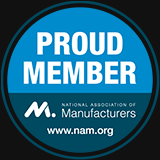Examining the growing ugly Christmas sweater market for SMEs and entrepreneurs on National Ugly Christmas Sweater Day, and the importance of the U.S. textile industry.

CERRITOS, California- December 15, 2017- Since 2011 the U.S. has celebrated National Ugly Christmas Sweater Day on every third Friday of December to commemorate eccentric, gaudy, or vintage sweaters for Christmas and winter Holidays. Two decades after these sweaters originally became popular in the 1980s, the once small ugly Christmas sweater market now generates millions of dollars year round.
 Toolots employees in their ugly Christmas sweaters.
Toolots employees in their ugly Christmas sweaters.Ugly Christmas sweaters and related products can be categorized in the U.S. textile industry. According to the National Council of Textile Organizations (NCTO), the U.S. textile industry collectively comprises “…yarn and fabric manufacturers, suppliers in the cotton, wool, and man-made fiber sectors, dyers, printers, and finishers, the machinery and textile chemical industries, [and] customers in the U.S. apparel industry.” As the leader in textile R&D globally, the U.S. has increased productivity of its textile mills by roughly 52% since 2000 and had $74.4 billion in shipment value in 2016. Aside from creating ugly holiday sweaters, the U.S. textile industry is also responsible for manufacturing and producing advanced fiber products such as antimicrobial fibers, recycled polyester fibers, fire-retardant fibers, and more. Additionally, the U.S. textile industry provides U.S. Armed Forces with over 8,000 textile products including, but not limited to, uniforms, ship composites, ropes and cables, ammunition pouches, and parachutes. Furthermore, the NCTO reports that the volume of items provided to the military can vary depending on activity and engagement, and most recently has ranged between $1.8 billion to more than $2.2 billion.
 Source: U.S. Bureau of Statistics Textile, Apparel, and Furnishings Workers (51-6099)
Source: U.S. Bureau of Statistics Textile, Apparel, and Furnishings Workers (51-6099)Following severe imports during the 1990s, a significant number of the U.S. textile and apparel industry’s annual profit currently derives from holiday shopping at the end of the year. Data collected by the U.S. Census Bureau for the 2016 Holiday Season found that 21.8% of Clothing Stores’ annual profit came from holiday sales completed in November and December alone. Similarly, holiday sales were roughly 23.7% of Department Stores’ annual profit, and 22.5% respectively for Discount Department Stores in 2016.

For SMEs in the ugly Christmas sweater business, a seasonal hobby that may have made them several hundred or several thousand dollars now has the potential to generate millions of dollars in profits. Despite major retailers and fashion designers entering into the market, SMEs and entrepreneurs generate a significant amount of revenue by using e-commerce stores to sell their vintage, licensed, or customized sweaters. For example, the Ugly Christmas Sweater Kit saw a sales increase of 1,000% just in 2013, the UglyChristmasSweater.com made $4.8 million in 2015, and the Tipsy Elves increased their revenue to $14 million last year from initial sales of roughly $900,000 in 2013.
About Toolots
Toolots, headquartered in Cerritos, California, offers an online marketplace and international distribution channel for factory-direct industrial tools, machinery, and manufacturing technology. Our user-friendly platform provides fast, easy access to high-quality, affordable equipment for manufacturers. More than a simple distribution channel, Toolots provides comprehensive services for companies around the world who produce the industrial machinery and equipment we sell, helping streamline the marketing, omni-channel sales, warehousing, fulfillment and after-sales service. On the customer end, Toolots simplifies the purchase, delivery, installation and warranty of industrial technology, machinery and components, and upholds product quality through a vetted network of vendors and service technicians. The company’s dedication to fostering international trade relations passes on cost savings to the consumer, contributes to reduced downtime, improves productivity and expands a manufacturer’s reach. Toolots has strategically located warehouses, showrooms, and offices across the United States, China and as of May 2017, has expanded into Taiwan. For more information visit us online at www.toolots.com.
###



 Toolots Team attending Day 2 of the Forum.
Toolots Team attending Day 2 of the Forum. Dr. Jessie Ying Zhan speaking to attendees about how Toolots has collectively worked to achieved success.
Dr. Jessie Ying Zhan speaking to attendees about how Toolots has collectively worked to achieved success. Student winners of Day 1's Hackathon attend Day 2's pitch competition.
Student winners of Day 1's Hackathon attend Day 2's pitch competition. Toolots CTO Bill Andreozzi speaking on the components of a good, successful pitch.
Toolots CTO Bill Andreozzi speaking on the components of a good, successful pitch.


